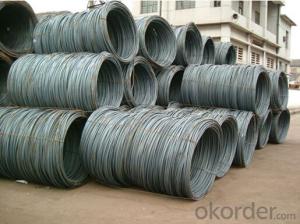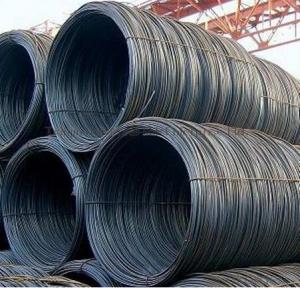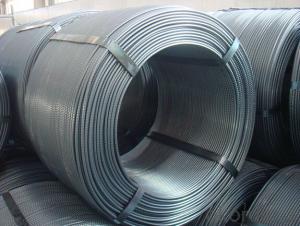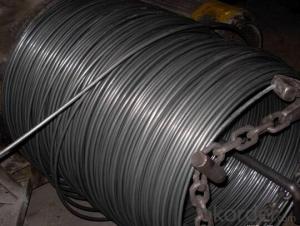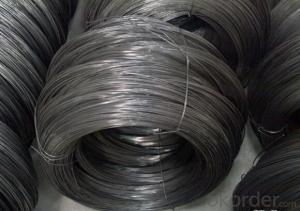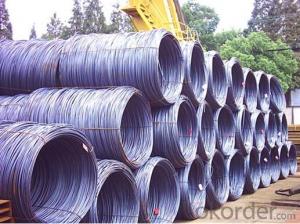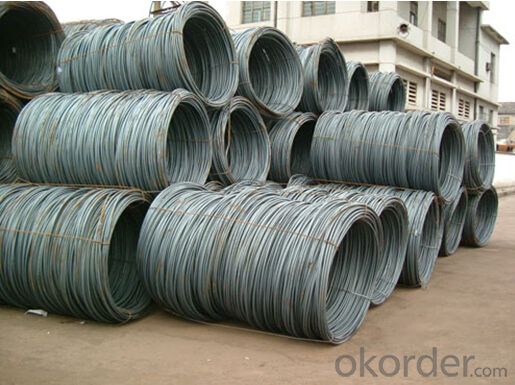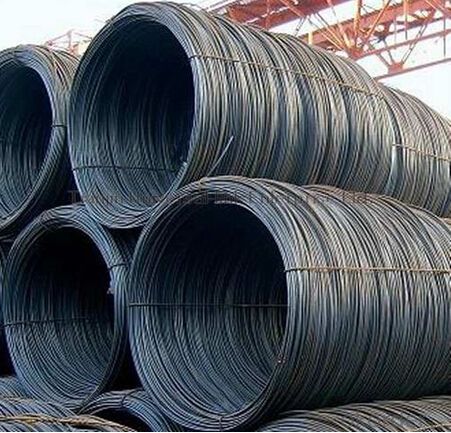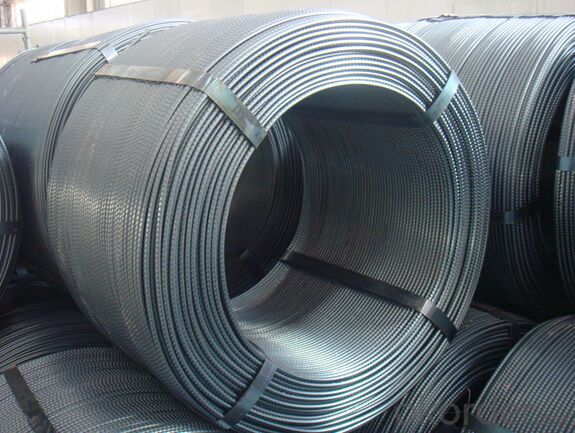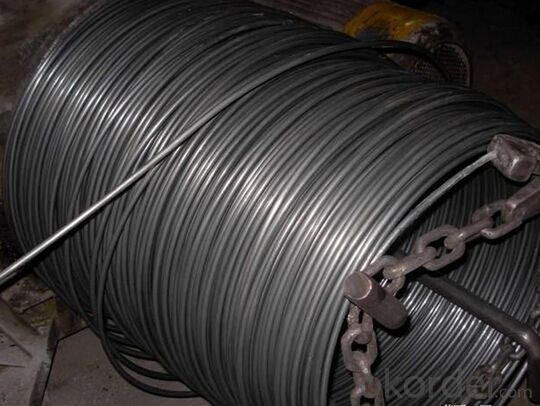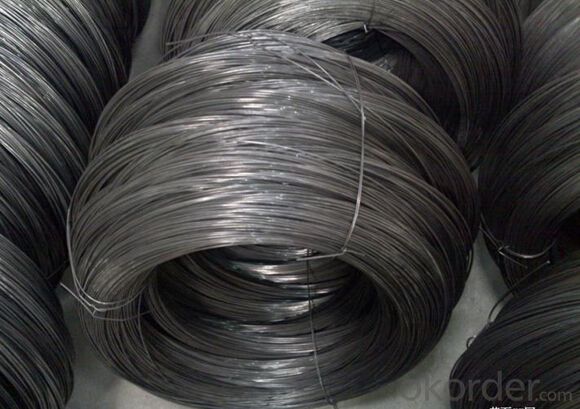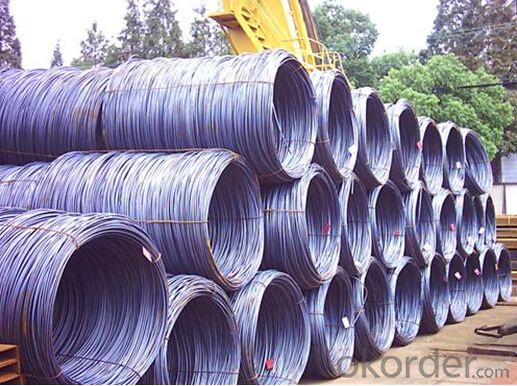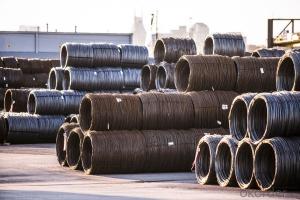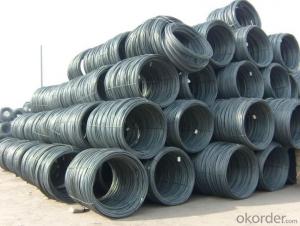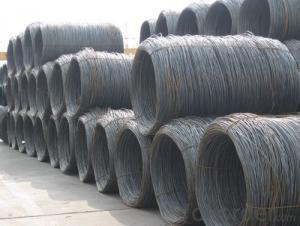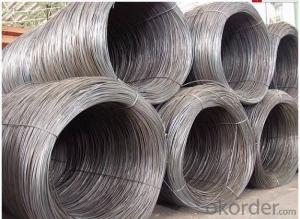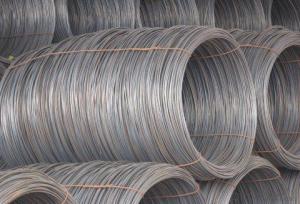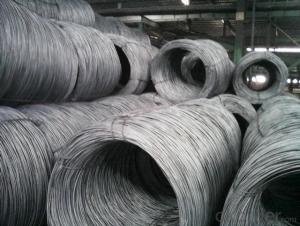SAE 1008Cr Low Carbon 6.5mm Wire Rod for Constructionr
- Loading Port:
- Tianjin
- Payment Terms:
- TT OR LC
- Min Order Qty:
- 3 m.t.
- Supply Capability:
- 10000 m.t./month
OKorder Service Pledge
Quality Product, Order Online Tracking, Timely Delivery
OKorder Financial Service
Credit Rating, Credit Services, Credit Purchasing
You Might Also Like
Specification
Type:
Stainless Steel,Deformed Steel,Gear Steel,Bearing Steel,Spring Steel,Alloy Steel,Carbon Steel
Shape:
Steel Billets,Steel Round Bar,Steel Angle,Steel Square Bar,Steel Flat Bar,Steel Wire Rod,Steel Sheet,Steel Coil
Technique:
Hot Rolled,Cold Rolled,Cold Drawn,ERW,Forged,Saw,Extruded,EFW,Spring
Surface Treatment:
Coated,Copper Coated,Color Coated,Oiled,Dry,Chromed Passivation,Polished,Bright,Black,PVDF Coated,Galvanized
Certification:
ISO,SGS,BV,IBR,RoHS,CE,API,BSI,UL
Thickness:
5.5mm-14mm
Width:
5.5mm-14mm
Length:
In coils
Outer Diameter:
5.5mm-14mm
Net Weight:
2m.t.
Packaging:
Seaworthy packaging
SAE 1008Cr Low Carbon 6.5mm Wire Rod for Constructionr
Detailed Information of the SAE 1008Cr Low Carbon 6.5mm Wire Rod for Constructionr
| Name | Hot Rolled High Carbon Wire Rod |
| Shape | Round Bar/Square Bar/Flat Bar/Plate/Wire |
| Standard | GB/ASTM/SAE/AISI/DIN/JIS/EN/BS |
| Surface Treatment: | Black/Peeling/Polished/Machined |
| Delivery Condition: | Hot Rolled or Forged/Peeled or Black Surface |
| Test | SGS/UT 100% Elements Testing |
| Certificate: | ISO/Mill Certificate |
| Service: | 24 hours online service / |
| more than 20 years trading and manufacture | |
| Quality Assurance: | the third party inspection, such as SGS, BV, TUV…etc. is acceptable |
| Packaging Details: | Seaworthy Packaging or as per customer's packing instruction |
Chemical Composition of the SAE 1008Cr Low Carbon 6.5mm Wire Rod for Constructionr
| Grade | Chemical Composition(%) | |||||
| C | Mn | Si | S | P | B | |
| SAE1008 | 0.1max. | 0.3~0.50 | 0.15max | 0.050max | ≤0.040 | >0.0008 |
| Mechanical properties | ||||||
| Yield strength(N/mm2) | Tensile strength(N/mm2) | Elongation(%) | ||||
| 250-280 | 350-380 | ≥32 | ||||
Company Introduction the SAE 1008Cr Low Carbon 6.5mm Wire Rod for Constructionr
CNBM International Corporation is the most import and export platform of CNBM group(China National Building Material Group Corporation) ,which is a state-owned enterprise, ranked in 270th of Fortune Global 500 in 2015.
With its advantages, CNBM International are mainly concentrate on Cement, Glass, Iron and Steel, Ceramics industries and devotes herself for supplying high quality series of refractories as well as technical consultancies and logistics solution.
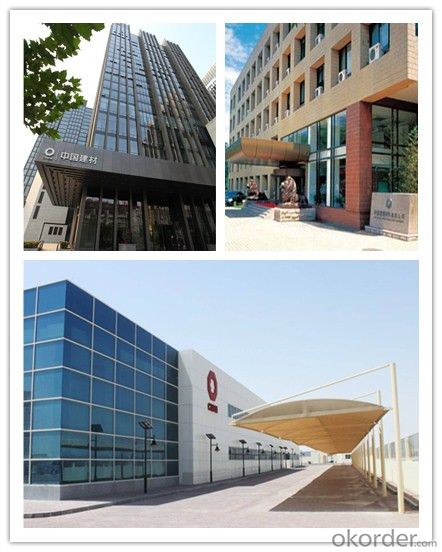
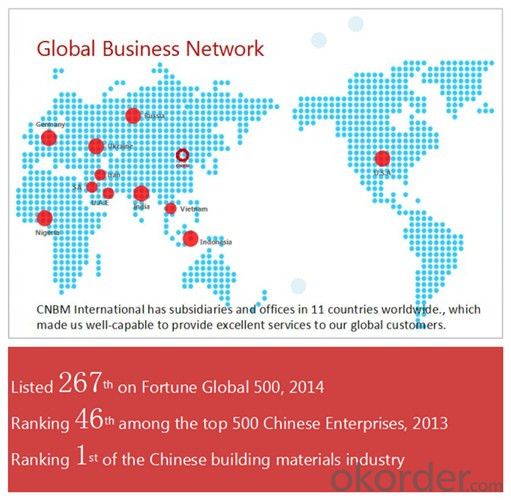
| After-sale service | CNBM provides the services and support you need for every step of our cooperation. We’re the business partners you can trust; you can relax and get on with doing business. |
| For any problem, please kindly contact us at any your convenient time, we’ll reply you in our first priority within 24 hours | |
| Advantages | Industry experience over 20 years. |
| Shipment of goods -More than 70 countries worldwide. | |
| The most convenient transport and prompt delivery. | |
| Competitive price with best service. | |
| High technical production line with top quality products. | |
| High reputation based on best quality products. |
Packaging & Delivery the SAE 1008Cr Low Carbon 6.5mm Wire Rod for Constructionr
| Packaging Detail | Sea worthy packing /as per customer's packing instruction |
| Delivery Detail | 15 ~ 40 days after receiving the deposit |
Products Show
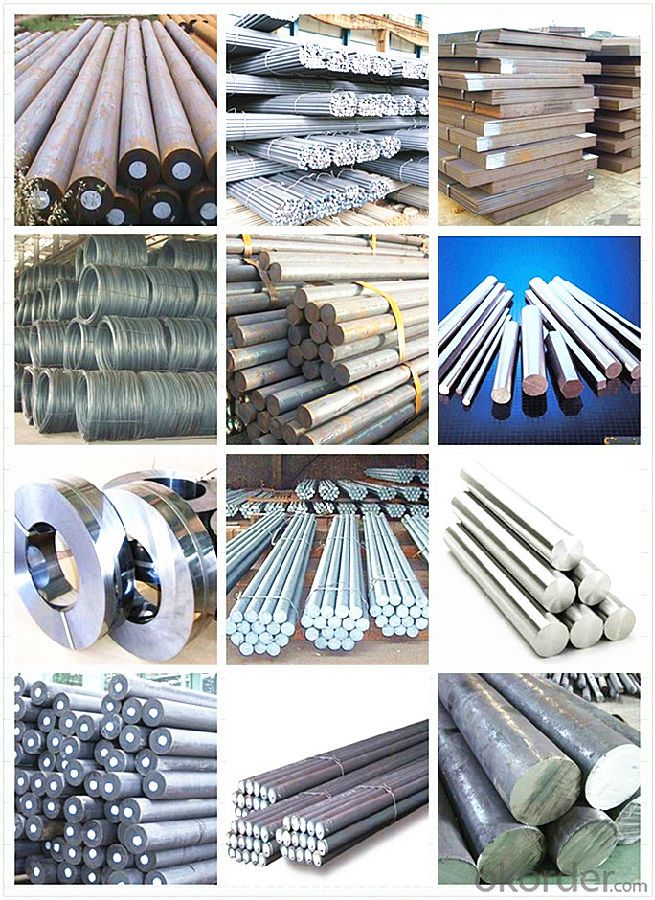
FAQ:
| Are you a trader or manufacturer? | Manufacturer |
| What’s the MOQ? | 3 metric ton |
| What’s your delivery time? | 15-35 days after downpayment received |
| Do you Accept OEM service? | Yes |
| what’s your delivery terms? | FOB/CFR/CIF |
| What's the Payment Terms? | 30% as deposit,70% before shipment by T/T |
| Western Union acceptable for small amount. | |
| L/C acceptable for large amount. | |
| Scrow ,Paybal,Alipay are also ok | |
| Why choose us? | Chose happens because of quality, then price, We can give you both. |
| Additionally, we can also offer professional products inquiry, products knowledge train (for agents), smooth goods delivery, excellent customer solution proposals. | |
| What's your available port of Shipment? | Main Port, China |
| What’s your featured services? | Our service formula: good quality+ good price+ good service=customer's trust |
| Where are your Market? | Covering more than 160 countries in the world |
- Q: Can special steel be used in the production of gears?
- Yes, special steel can be used in the production of gears. Special steel is often chosen for gear manufacturing due to its high strength, durability, and resistance to wear and fatigue. It allows for the production of gears that can withstand heavy loads, high speeds, and harsh operating conditions.
- Q: How does special steel contribute to the oil and gas machinery industry?
- Special steel plays a crucial role in the oil and gas machinery industry by offering a range of properties and characteristics that are essential for the demanding and harsh operating conditions in this sector. Firstly, special steel is known for its exceptional strength and durability, enabling it to withstand the extreme forces and pressures involved in oil and gas extraction, transportation, and refining processes. This ensures that the machinery can operate reliably and efficiently, minimizing downtime and maintenance costs. Moreover, special steel possesses excellent corrosion resistance, which is vital in an industry where equipment is constantly exposed to corrosive environments, such as seawater, acidic gases, and high-temperature fluids. By using corrosion-resistant special steel, manufacturers can increase the lifespan of their machinery, reduce the risk of equipment failure, and enhance the overall safety of operations. Another key advantage of special steel in the oil and gas machinery industry is its high temperature resistance. Equipment used in this industry often operates at extremely high temperatures, particularly in processes like drilling, refining, and petrochemical production. Special steel alloys can withstand these elevated temperatures without losing their structural integrity, ensuring the safe and efficient functioning of the machinery. Furthermore, special steel offers excellent wear and abrasion resistance properties, making it ideal for components that are exposed to constant friction, such as valves, pumps, and drilling tools. This resistance to wear and abrasion helps to prolong the lifespan of these components, reduce maintenance requirements, and enhance the overall efficiency of the machinery. Overall, special steel contributes significantly to the oil and gas machinery industry by providing the necessary strength, durability, corrosion resistance, high temperature resistance, and wear resistance required for the demanding operating conditions in this sector. By utilizing special steel alloys, manufacturers can create robust and reliable machinery that can withstand the challenges of the oil and gas industry and help ensure the smooth and safe extraction, transportation, and processing of oil and gas resources.
- Q: How does special steel perform in chemical resistance applications?
- Special steel is renowned for its exceptional performance in applications requiring resistance to chemicals. Its unique composition and properties render it highly impervious to corrosion and damage resulting from exposure to various chemical substances. Special steel is crafted using alloys that incorporate elements such as chromium, nickel, and molybdenum, which confer outstanding resistance to acids, alkalis, and other corrosive agents. In the realm of chemical resistance applications, special steel offers multiple advantages. Firstly, it exhibits remarkable resistance to pitting corrosion, a form of localized corrosion that manifests on metal surfaces. This characteristic renders it suitable for usage in environments where chemicals may inflict harm upon the metal surface. Secondly, special steel displays excellent resistance to crevice corrosion, which arises within confined spaces or gaps between metal surfaces. This property proves particularly advantageous in chemical processing equipment, where tight joints and connections are prevalent. Moreover, special steel retains its mechanical strength and integrity even in the harshest chemical environments. It can withstand high temperatures, pressure, and exposure to aggressive chemicals without compromising its structural robustness. This renders it exceedingly reliable and durable, ensuring an extended service life and reduced maintenance costs. All in all, the extraordinary chemical resistance properties of special steel make it the preferred choice for a wide array of applications. Whether employed in chemical processing plants, pharmaceutical industries, or oil and gas refineries, special steel offers the necessary safeguard against corrosion and chemical-induced damage. Its ability to endure harsh environments while maintaining optimal performance over time renders it an ideal material for chemical resistance applications.
- Q: What are the different heat-resistant grades of special steel?
- There are several heat-resistant grades of special steel that are specifically designed to withstand high temperatures and thermal stress. Some of the commonly used heat-resistant grades include: 1. Stainless Steel 310: This grade of stainless steel is known for its excellent resistance to high temperatures, oxidation, and corrosion. It can withstand temperatures up to 1100°C (2012°F) and is often used in furnace parts, heat treatment baskets, and other heat-intensive applications. 2. Inconel 600: Inconel 600 is a nickel-chromium alloy that offers exceptional resistance to high temperatures and oxidation. It can operate effectively in temperatures ranging from cryogenic to 1093°C (2000°F) and is widely used in gas turbines, heat exchangers, and other high-temperature environments. 3. Hastelloy C-276: Hastelloy C-276 is a nickel-molybdenum-chromium alloy that offers excellent resistance to a wide range of corrosive environments and high temperatures. It can withstand temperatures up to 1093°C (2000°F) and is commonly used in chemical processing, power generation, and pollution control applications. 4. Titanium Grade 2: Titanium Grade 2 is a commercially pure titanium alloy that exhibits good resistance to high temperatures and corrosion. It can operate effectively in temperatures up to 538°C (1000°F) and is often used in heat exchangers, chemical processing equipment, and marine applications. 5. Alloy 617: Alloy 617 is a nickel-chromium-cobalt-molybdenum alloy that offers exceptional strength and resistance to high-temperature environments. It can withstand temperatures up to 1204°C (2200°F) and is commonly used in gas turbines, petrochemical plants, and other heat-intensive industries. These are just a few examples of the heat-resistant grades of special steel available in the market. The selection of the appropriate grade depends on the specific temperature requirements, corrosion resistance, and mechanical properties needed for the application.
- Q: How does special steel contribute to the manufacturing of structural components?
- Special steel plays a crucial role in the manufacturing of structural components due to its unique properties and characteristics. Firstly, special steel offers exceptional strength and durability, making it an ideal material for constructing load-bearing structures. It can withstand high levels of stress, pressure, and heavy loads, ensuring the structural integrity and safety of the components. Furthermore, special steel possesses excellent corrosion resistance, which is particularly important for structural components exposed to harsh environments, such as bridges, offshore platforms, or buildings near the coast. This corrosion resistance helps prevent rusting and deterioration, prolonging the lifespan of the structural components and reducing maintenance costs. Moreover, special steel offers a high degree of versatility in terms of design and fabrication. It can be easily shaped, molded, and welded, allowing manufacturers to create complex and intricate structural components with precision. This flexibility enables the production of customized components that meet specific requirements and specifications, enhancing the overall performance and functionality of the structures. Additionally, special steel exhibits excellent heat resistance and fireproofing properties, making it suitable for components exposed to high temperatures or fire hazards. This is particularly important in the manufacturing of structural components for industrial facilities, power plants, or transportation infrastructure, where fire protection is vital. Furthermore, special steel often has superior fatigue resistance, enabling it to withstand repetitive or cyclic loading without suffering from fatigue failure. This property is crucial for structural components subjected to dynamic or fluctuating loads, such as bridges, cranes, or machinery parts. Overall, special steel greatly contributes to the manufacturing of structural components by providing strength, durability, corrosion resistance, versatility in design, heat resistance, fireproofing, and fatigue resistance. Its unique properties make it an essential material choice for constructing safe, reliable, and long-lasting structures across various industries.
- Q: How is special steel used in the production of pressure vessels?
- Special steel is used in the production of pressure vessels due to its high strength, durability, and resistance to corrosion. It ensures the vessel can withstand high internal pressure and harsh operating conditions, ensuring safety and reliability.
- Q: How does the hardness of special steel affect its machinability?
- The hardness of special steel has a direct impact on its machinability. Generally, as the hardness of steel increases, its machinability decreases. Harder steel is more difficult to cut, shape, and form due to its increased resistance to deformation. Consequently, machining operations, such as drilling, milling, or turning, become more challenging and require specialized tools and techniques to achieve the desired results.
- Q: What is the cost of special steel compared to regular steel?
- The cost of special steel is generally higher compared to regular steel due to its higher quality, specific composition, and unique properties, which make it more suitable for specialized applications.
- Q: What are the different surface coatings available for special steel?
- There are several different surface coatings available for special steel, including galvanized coatings, zinc coatings, powder coatings, epoxy coatings, and chrome coatings. These coatings provide various benefits such as corrosion resistance, improved durability, enhanced aesthetics, and increased lifespan of the steel. The choice of coating depends on the specific application and desired properties for the steel.
- Q: How does special steel contribute to the aerospace turbine industry?
- Special steel plays a crucial role in the aerospace turbine industry by offering various advantages that cannot be found in other materials. Firstly, special steel is known for its exceptional strength and durability, making it ideal for withstanding the extreme conditions within aerospace turbines. The high temperatures, pressures, and rotational speeds experienced by turbine components demand a material that can withstand these harsh conditions without compromising performance or safety. Additionally, special steel exhibits excellent heat resistance and corrosion resistance properties, which are essential for the longevity of turbine components. The ability to resist oxidation and corrosion allows special steel to maintain its structural integrity and functionality over extended periods of time, reducing the need for frequent maintenance or replacement. Moreover, special steel offers excellent machinability and formability, enabling the production of complex and intricate turbine components. This allows for the creation of highly efficient and precisely engineered turbine blades, vanes, and other critical parts that are essential for the optimal performance of aerospace turbines. Furthermore, special steel provides the necessary characteristics for improved fuel efficiency in aerospace turbines. By utilizing high-strength special steel alloys, turbine manufacturers can design lighter and more aerodynamic components, reducing overall weight and drag. This, in turn, leads to increased fuel efficiency and lower emissions, contributing to a more sustainable and environmentally friendly aviation industry. In conclusion, special steel plays a pivotal role in the aerospace turbine industry by providing the necessary strength, durability, heat resistance, corrosion resistance, and machinability required for the efficient and reliable operation of turbine components. Its contribution to the industry extends to improved fuel efficiency, reduced maintenance needs, and enhanced overall performance, making it an indispensable material for the aerospace turbine industry.
Send your message to us
SAE 1008Cr Low Carbon 6.5mm Wire Rod for Constructionr
- Loading Port:
- Tianjin
- Payment Terms:
- TT OR LC
- Min Order Qty:
- 3 m.t.
- Supply Capability:
- 10000 m.t./month
OKorder Service Pledge
Quality Product, Order Online Tracking, Timely Delivery
OKorder Financial Service
Credit Rating, Credit Services, Credit Purchasing
Similar products
Hot products
Hot Searches
Related keywords
